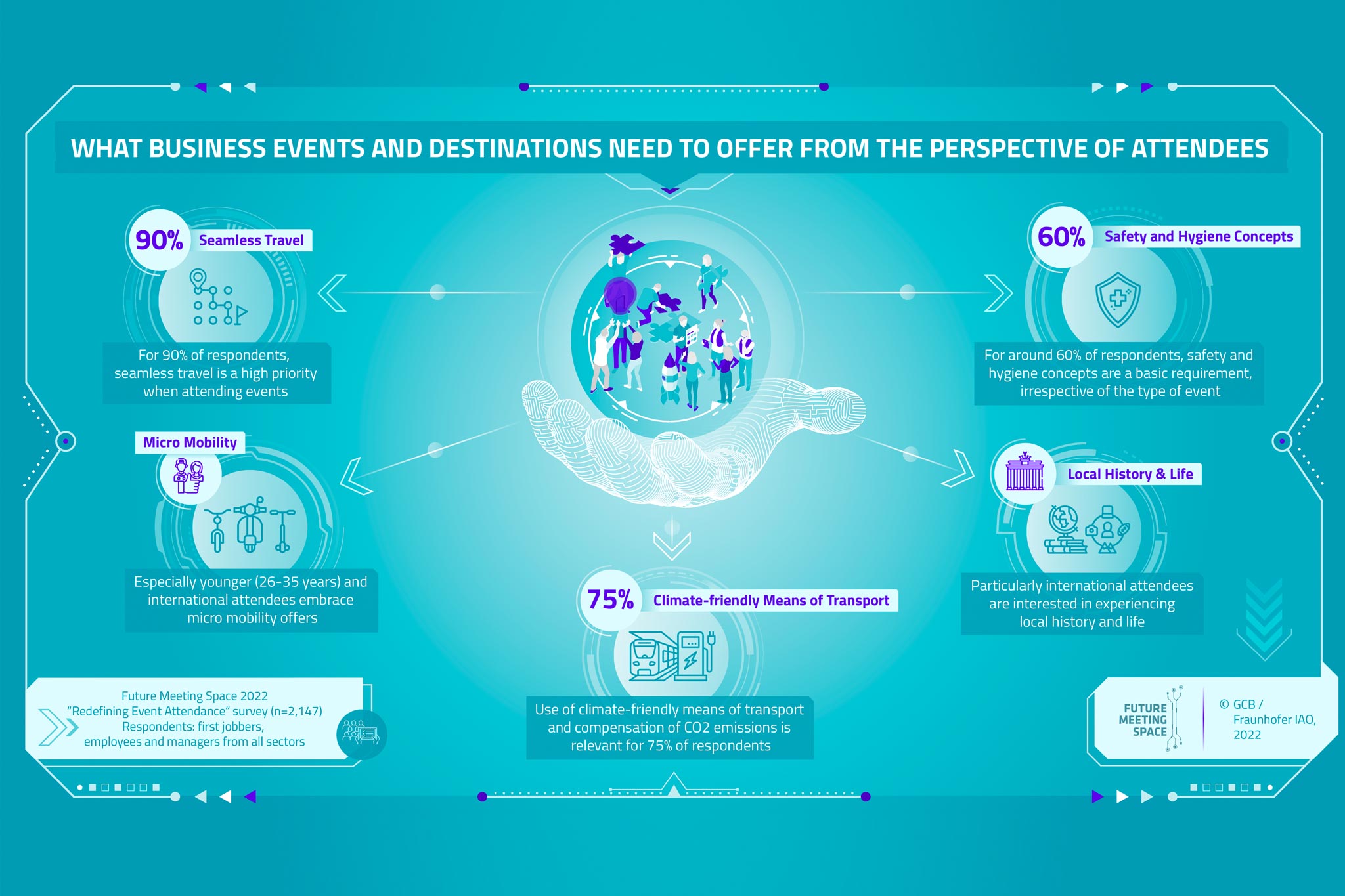Key for inspiration and staff retention: sustainability considerations of increasing importance.
Why will people attend in-person events in the future was one of the core questions of this year’s Future Meeting Space (FMS) research focus. On 14 December, the innovation network presented the full results of its 2022 research phase “Redefining Event Attendance” in a hybrid set-up with more than 700 registered online attendees and around 30 selected guests on site in Frankfurt. In 2023, the GCB German Convention Bureau and the Fraunhofer Institute for Industrial Engineering IAO will continue their research activities jointly with partners under the headline “Navigating Business Events in Challenging Times.”
The third and final survey carried out as part of this year’s FMS research, which was presented for the first time during the results presentation, analysed the requirements and key components needed for successful business events along the entire customer journey. The differentiated view of national and international attendees reveals that factors such as seamless travel, micro mobility, safety and hygiene as well as regional and cultural characteristics can contribute to significantly increase people’s motivation to travel to events. 90 per cent of respondents said that seamless travel is very important to them. This goes hand in hand with safety and hygiene standards, which are an absolute basic requirement for 60 per cent of those surveyed to attend an event. The use of climate-friendly means of transport and offsetting the CO₂ emissions generated by events are relevant for 75 per cent of the respondents. Micro mobility means and cultural experiences at the respective destination are particularly appealing to the 26 to 35 age bracket and international attendees. Opportunities to experience the local character is therefore one of the absolute must-have components for getting international attendees to attend in-person events.
Inspiration, employer attractiveness and sustainability
Overall, this year’s FMS research reveals three key findings: Firstly, in-person events are mainly attractive because of their ability to inspire people and provide opportunities for face-to-face encounters. New ideas emerge mainly when we interact with other people. “Events continue to deliver when it comes to inspiring people and promoting innovation,” says GCB managing director Matthias Schultze. “Diving into different, local cultures and creating shared experiences only works at live events. As a sustainable, authentic and innovative meetings destination, Germany provides an ideal environment to achieve this.”
Secondly, the research shows the importance of events for staff retention and employer attractiveness. Events and business travel are not only a relevant tool for recruitment, but also promote long-term loyalty to companies. Thirdly, the survey data reveal that sustainability plays a significant role in the decision-making process whether to attend in-person events or not. Factors taken into consideration include the possibility of climate-neutral travel, offsetting CO₂ emissions as well as regional and seasonal catering.
Outlook: new research focus in 2023
The “Redefining Event Attendance” research confirmed that in-person events are unique and irreplaceable. While face-to-face encounters have temporarily decreased in recent years, they still have immense value. Nevertheless, business events are faced with multiple challenges, such as climate change, energy supply, international conflicts, the pandemic, staff and skills shortages. “What solutions can events offer in this context? And how do these multiple crises influence event strategies and concepts? FMS will take an in-depth look at these complex questions in 2023 and try to find answers under the headline ‘Navigating Business Events in Challenging Times’,” says Dr Stefan Rief, Head of Organisational Development and Work Design Research Unit at Fraunhofer IAO.
The full “Redefining Event Attendance” study as well as the recording of the results presentation on 14 December 2022 will be available as a free download in January.



